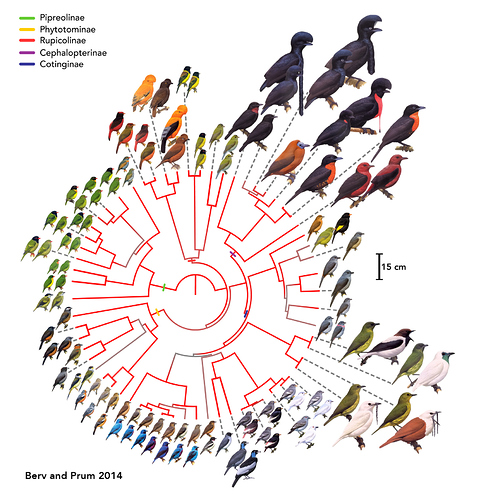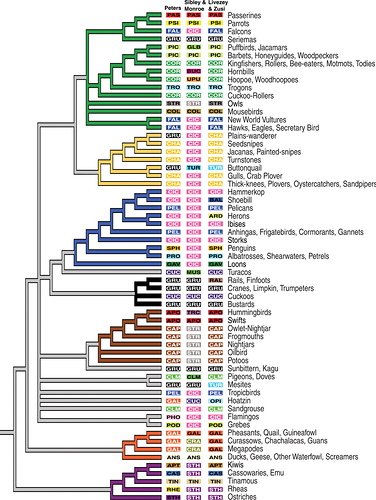He did get a few “likes” for it, though. ![]()
Is it surprising to me that people who lean toward ID have problems with how the term evolution is defined? No. Is it surprising to me that professional scientists have problems with a simplified definition you might find in an intro textbook? No.
In the macro/micro discussion, which we’ve learned are terms used in a relatively small number of legitimate academic papers, I am always curious where one draws a line. It seems a bit simplistic on one side to argue that there is no distinction, but the other side emphasizes the distinction but to an extreme level. The different between the two in the latter case is whatever it needs to be to reject ‘macroevolution.’
I see. It sounds really sciencey but that’s not really that rigorous and a bit strawmanish. Is losing limbs, hair and other feature while gaining a few other a gain or loss of statistical information as it would have been as cetaceans document as they transition from land dwelling mammals.
Anyways, my interest lies in phylogenies like this one:
I always wonder how far one allows ‘micro’ changes to go and where one draws the line for that which is ‘impossible.’ Like can all of these birds be ‘microevolution?’
But maybe let’s expand it a bit and can anyone say when ‘micro’ clearly stops:
It’s not so much a matter of how fast… as opposed to the size of the steps taken in evolution… and whether the change is continuous…
An alternate understanding is punctuated equilibrium… With relatively abrupt or saltational speciation.
I think Ashwin was using an ancient form of humor called “Satire.”
How difficult would it be to give a good definition in textbooks?
Surely it’s not such an abstract and I’ll defined concept that the task is impossible?
Why blame people who lean towards ID, they don’t write the textbooks.
All of which can be bickered over (and perhaps even definitively answered) by knowledgeable parties, but need not continuously restrict what can be broadly construed as “evolution” to lay conversations. – any more than our personal convictions over specific denominational doctrines need restrict what can fall within the broad category known as “religion”.
My satire meter must be on the fritz this morning!
I don’t think anyone’s saying it’s not a “good” definition – simply that it’s inadequate, especially the more you get into the subject. I’d think that would be true of most subjects, especially large and complex ones. Simply reading a definition will only get you so far without immersing yourself in it.
I thought we agreed on this thread that “descent with modification” and “genetic change over time” are good definitions. Word-smithing is not “controversy” in my book.
Wouldn’t it be fair to say that an inadequate definition is not good?
Evolutionary science is far more than the meaning of the word evolution… It’s unfortunate that this word is very difficult to pin down . It leads to conversations where people use it differently and talk across each other.
An agreed upon definition would help communication.
Yes they would… But then that’s a theory… Evolution is just a word…
I am sure people will find a lot to nitpick about theories of evolution…
I seem to have bumped into people on a very tense day…![]()
That is the nature of language. Almost any word with semantic content can be used differently in different contexts by different speakers.
My point is that all definitions are inadequate. I’m really not sure what you’re looking for here. But I’d agree that it’s important to know where someone is coming from when you’re both using the word “evolution.” As a YEC, “evolution” was usually a word I heard or used as a title for an entire secular worldview that encompassed an old earth, “random chance,” common descent, etc. As such, I was in a position where it was almost impossible to actually learn anything about it because I had already made up my mind about what was being discussed by others.
I seem to have bumped into people on a very tense day…
It seems like a great discussion here to me! If anybody is feeling tense they can dip on over to the humor thread for a break.
Evolution is just a word…
I am sure people will find a lot to nitpick about theories of evolution…
“Astronomy” is just a word too. Isn’t this a bit like insisting that dark matter, dark energy, etc. all be nailed down and well-defined before anybody is allowed to admit or discuss well-accepted astronomical findings? However fuzzy stuff around the edges (like parallel universes) or beyond the edges (like astrology) --however fuzzy those edges may be, we don’t fret over the whole category of astronomy as therefore having deficient boundaries.
It seems like a great discussion here to me! If anybody is feeling tense they can dip on over to the humor thread for a break.
I am coming from there… there’s some good stuff there…
Macroevolution: genetic change that requires a statistically significant increase in functional information.
Hm. Sounds reasonable at first blush. But may I use an analogy to explore some practical application?
A few years ago I visited Utah and observed with wonder the large stone arches scattered around the landscape. Let us suppose for the sake of argument that “functional information” underlies these formations; after all, all physical matter can be represented by “information.”
When would the “statistically significant increase in functional information“ have occurred? When wind and water weathered the stone away under the arch? But wouldn’t that be a loss of information, not a gain? When the original stone formed, compressed far beneath the surface? When the sand was laid down in uneven patterns long before that?
None of these steps, individually, would qualify as “significant increase in functional information.” You would not point to what was going on at any given point in the history of the rock formation and say, “here we see this rock’s complexity increasing.” And yet the end result, beautiful sandstone arches lifting high above the desert, seems far more complex than the loose sand they began as.
Which is to say, your definition of macroevolution is designed to make a multi-step process seem like it should appear in a single time where we can point to it. Those who say, “But we don’t see evolution turning a cat into a dog!” have fallen into the pitfalls of thinking like this.
Mutations may increase, decrease, or keep constant genetic information. A small fraction of all mutations would qualify as ‘functional.’ And these functional mutations tend to accumulate over time as deleterious mutations sooner or later tend to get weeded out. I read your article and definitions, but it still wasn’t clear how “statistically significant” was supposed to be measured: as a percentage of the entire genome? Of functional DNA? Of overall changes? The entire thing has a ways to go before approaching scientific rigor.
I am very interested to see if there is any answer to the question posed by @pevaquark, about which birds could descend from common ancestors and which supposedly could not.
When would the “statistically significant increase in functional information“ have occurred?
This is an interesting question that reflects on the metaphysical limitations of current science. I just happen to have been reading a piece by the well-known Thomist Ed Feser. Under Aristotelian metaphysics there would be no trouble at all in distinguishing the “form” (aka “information”) that might be thought to reside in a wind-blown arch from the kind of information that might be required for a new species of living organism.
Is this relevant to the ID concept of “functional information”? Only obliquely since Feser and many other Thomists argue against ID. But it’s possible to glimpse its significance when you consider that it seems impossible to make a scientific definition of “information” in the sense that humans actually use it every day - for example, defining the kind of information we have exchanged on this thread.
Why should it be hard to define something that is not only in everyday use, but the defining element of our “information age?” The answer is that science lacks the metaphysical concepts to attempt such a definition. It ought to be possible to describe what makes an artifact or a living creature different from an effect of the weather, surely?
This only loosely links to the thread topic, I’m afraid, but it might give food for thought that in looking for a definition of “evolution,” we appear to be trying to find a kind of thing we can’t even find a scientific definition for itself, ie a “definition.” Why should that be so hard?
However, chromosomal rearrangements are textbook mechanisms (whether efficacious or not) or parapatric or sympatric speciation.
I know.
But back to your claim…
Can you point me to a case of parametric or sympatric speciation that involves/involved no changes in allele frequencies?
But isn’t the whole point of a definition to provide the exact boundaries of how something (in this case, the world “evolution” is represented?
No, that’s not “the whole point of a definition,” especially not in the present context, which involves laypeople with widely varying levels of understanding of a vast field of inquiry, and which is frequented by apologists busily erecting strawmen.
More notably, now that you are debating the definition of “definition,” we have reached Peak Pedantry. That, by the way, is a precise linguistic phrase defined carefully and completely here.
More notably, now that you are debating the definition of “definition,” we have reached Peak Pedantry .
Oh come now! Surely we’re only just in the foothills yet. ![]()
![]() Though I am inclined to agree with you in this case that there is room for lay generality (or there had better be – room will be made for it if there isn’t). But there are those who do have to concern themselves very much with definitions and boundaries – to regulate all sorts of things for legal purposes in this world. The question some put forward is: is this one of them? I am personally not thinking so, but I listen with interest to others on that.
Though I am inclined to agree with you in this case that there is room for lay generality (or there had better be – room will be made for it if there isn’t). But there are those who do have to concern themselves very much with definitions and boundaries – to regulate all sorts of things for legal purposes in this world. The question some put forward is: is this one of them? I am personally not thinking so, but I listen with interest to others on that.

